Embarking on a backpacking journey near Revelstoke, British Columbia, offers an opportunity to explore diverse terrains and pristine wilderness. Let's detail some of the top trails in the area and provide you with essential preparation tips to ensure a safe and enjoyable adventure.
Top Backpacking Trails Near Revelstoke

Eva Lake Trail in Mount Revelstoke National Park
Trail Overview
Distance: Approximately 14 km round trip.
Elevation Gain: Around 500 meters.
Trailhead: Summit of the Meadows in the Sky Parkway.
Highlights
The Eva Lake Trail guides hikers through subalpine meadows rich with wildflowers, leading to the tranquil Eva Lake. This spot is ideal for photography and relaxation, offering a serene environment away from daily life.
Camping Information
A designated backcountry campground at Eva Lake provides four reservable tent pads, a pit toilet, and bear-proof food storage lockers. Reservations are required and can be made through Parks Canada.
Jade Lakes Trail in Mount Revelstoke National Park
Trail Overview
Distance: Approximately 19 km round trip.
Elevation Gain: Approximately 700 meters.
Trailhead: Summit of the Meadows in the Sky Parkway.
Highlights
This trail takes hikers through varied alpine terrains to the Upper and Lower Jade Lakes. The area offers opportunities for wildlife sightings and expansive mountain views, making it a rewarding experience for those seeking a moderate challenge.
Camping Information
The backcountry campground at Jade Lakes is equipped with four reservable tent pads, a pit toilet, and bear-proof food storage lockers. Reservations are necessary and can be secured through Parks Canada.
Abbott Ridge Trail in Glacier National Park
Trail Overview
Distance: 13.6 km round trip minimum.
Elevation Gain: Approximately 1,029 meters.
Trailhead: Illecillewaet Campground.
Highlights
The Abbott Ridge Trail presents a challenging ascent, rewarding hikers with panoramic views of the Selkirk Mountains and the Illecillewaet Glacier. Along the way, Marion Lake offers a scenic spot for rest and reflection.
Camping Information
Backcountry camping is permitted; however, there are no designated facilities. Campers must adhere to Leave No Trace principles to preserve the natural environment.
Mount Begbie Trail
Trail Overview
Distance: 14 km round trip.
Elevation Gain: Approximately 1,800 meters.
Trailhead: Mount Begbie Forest Service Road.
Highlights
Mount Begbie stands as an iconic peak, offering challenging terrain with rewarding summit views of the Columbia River and surrounding ranges. The trail includes steep sections and glacier crossings near the summit, making it suitable for experienced hikers.
Camping Information
There are no established campsites; however, alpine meadows below the summit serve as common bivouac spots. This trail is recommended for seasoned mountaineers equipped with appropriate gear.
Miller Lake Trail in Mount Revelstoke National Park
Trail Overview
Distance: Approximately 11.6 km round trip.
Elevation Gain: Around 400 meters.
Trailhead: Summit of the Meadows in the Sky Parkway.
Highlights
The Miller Lake Trail offers hikers a journey through lush subalpine meadows, leading to the serene Miller Lake. The trail provides opportunities to observe diverse flora and fauna, making it a delightful experience for nature enthusiasts.
Camping Information
While there is no designated campground at Miller Lake, backcountry camping is permitted. Campers should practice Leave No Trace principles and ensure they are well-prepared for backcountry conditions.
Mount Cartier Trail
Trail Overview
Distance: Approximately 30-33 km round trip.
Elevation Gain: Approximately 2300 meters.
Trailhead: Mount Cartier Trailhead, accessible via Mount Cartier Road.
Highlights
The Mount Cartier Trail is a strenuous hike that rewards adventurers with panoramic views of the Columbia Valley and Revelstoke. The trail traverses dense forests before reaching alpine ridges, offering a diverse hiking experience.
Camping Information
A historic fire lookout cabin is located near the summit and is available on a first-come, first-served basis. Hikers intending to stay overnight should be prepared for variable weather conditions and carry appropriate gear.
Preparing for Your Backpacking Adventure

Physical Conditioning
Cardiovascular Fitness
Engage in regular aerobic activities such as hiking, running, or cycling to build endurance. Consistent cardiovascular exercise prepares the body for the demands of backpacking.
Strength Training
Focus on strengthening leg muscles, core stability, and upper body strength. Exercises like squats, lunges, and planks can help in managing steep ascents and carrying a loaded backpack.
Flexibility and Balance
Incorporate stretching routines and balance exercises into your fitness regimen. Yoga and pilates can enhance flexibility and balance, reducing the risk of injuries on uneven terrains.
Essential Gear and Packing Tips
Backpack
Select a comfortable, well-fitted pack with a capacity of 50-70 liters for multi-day trips. Ensure it has adjustable straps and a supportive frame to distribute weight evenly.
Clothing
Layering System: Utilize a base layer for moisture-wicking, an insulating mid-layer, and a waterproof/windproof outer layer.
Materials: Opt for merino wool or synthetic fabrics; avoid cotton as it retains moisture, which can lead to discomfort and hypothermia in cooler conditions.
Shelter and Sleeping
Carry a lightweight tent or bivy sack suitable for alpine conditions. A sleeping bag rated for below freezing temperatures is advisable, considering potential mountain weather variations.
Navigation Tools
Equip yourself with topographical maps, a compass, and a GPS device or smartphone with offline maps. Familiarize yourself with the trail and surrounding area before setting out.
Safety Equipment
Essential items include a first aid kit, bear spray, and a reliable headlamp with extra batteries. These tools are crucial for addressing emergencies and ensuring personal safety.
Food and Water
Plan for high-energy, non-perishable food items. Carry sufficient water and a filtration system or purification tablets to access natural water sources safely.
Understanding Trail Conditions and Regulations

Seasonal Considerations
Trail accessibility can vary with seasons. Snow can persist in higher elevations, affecting trail conditions. Always check current trail statuses before planning your trip.
Wildlife Awareness
The Revelstoke area is home to diverse wildlife, including bears and cougars. Educate yourself on local wildlife, carry bear spray, and store food securely to minimize encounters.
By selecting the appropriate trail and preparing thoroughly, your backpacking experience near Revelstoke will be both memorable and safe. Embrace the adventure and the natural beauty that awaits in this remarkable region.





